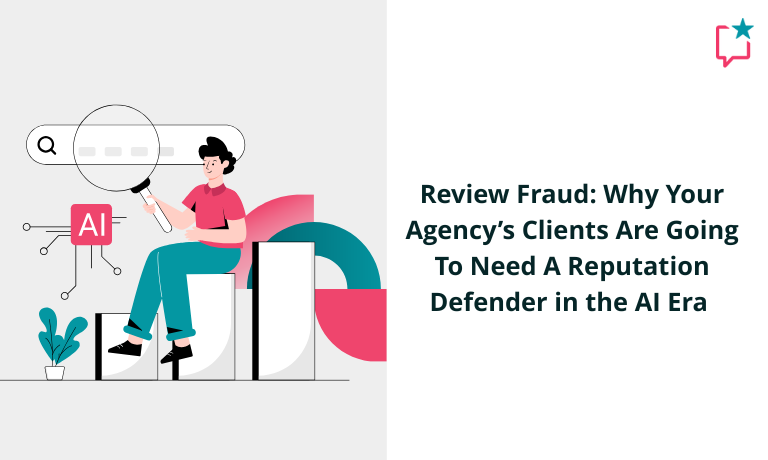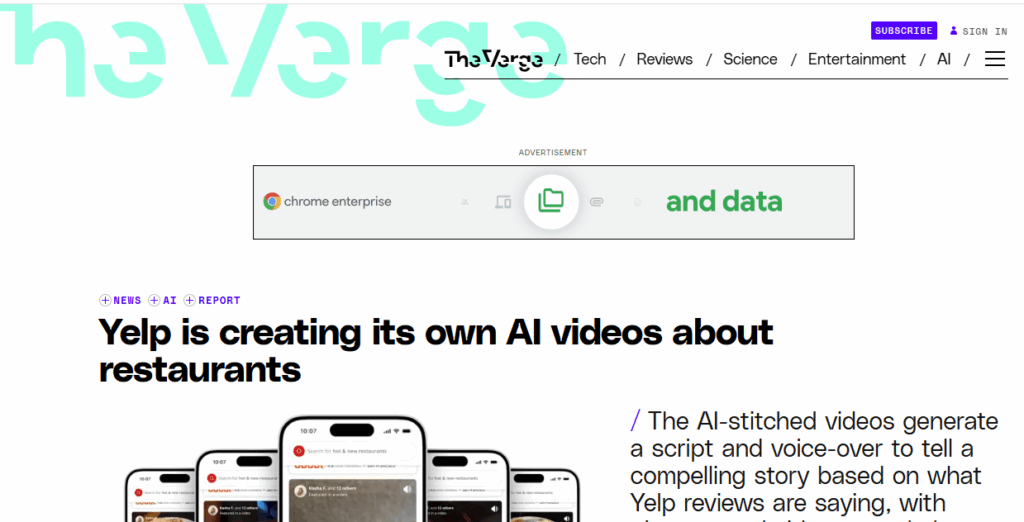
If you’re running a local business marketing agency, I bet you’ve taught many clients that:
- They must present themselves authentically to earn customer trust
- They must build meaningful relationships with local people to earn community loyalty
Sounds familiar, right? But there are now three different categories of online fraud and fakery that are actively attempting to spoil this beautiful, sensible strategy.
I don’t doubt that you’re regularly examining your agency’s menu of services, wondering whether there are new offerings you should add to better serve clients.
You know from experience that many very talented business owners are simply too busy to devote the necessary time to basic tasks like local business listings management or review monitoring across multiple platforms. When it comes to a topic as unwieldy as reputation defense, these clients will understandably throw up their hands once they see the scale of the problem.
Today, I’m going to show you the three categories of reputation threats and suggest you consider how to build new services around protecting clients from them.
Understanding the 3 types of reputation threats your clients face
There’s a genuine risk of local search becoming unmoored from reality. Here are three reputation-related aspects of this problem you should talk to your clients about.
Type 1: The unlevel local search engine results playing field

Review volume and recency are strongly believed to play a role in Google’s local ranking algorithm that orders results like the local pack shown above. This invites unscrupulous businesses to try to game the system.
Consumers seeking authenticity but encountering results like this one have to ask themselves:
- Why does the higher-ranked business have about 20x as many reviews as most of the competitors in this set?
- Is it because they are 20x better at the service they provide?
- Is it because they are doing a much better job at asking customers for reviews?
- Or, is something fishy going on here with business #1?
I’ve intentionally obscured real-world business details in my screenshot because, even as a local SEO, I can’t absolutely confirm what is going on in a scenario like this one, which I encounter all the time.
What I do know is that lopsided review counts can result from review fraud, which may consist of:
- The business reviewing itself
- The business telling its employees to review the brand
- The business buying or incentivizing reviews
- The business hiring a marketing firm that engages in review fraud
Review spam of this kind is not new. Well over a decade ago, multiple companies were being fined for publishing fake reviews in an attempt to game the system. In 2024, the FTC issued its final ruling on reputation fraud and assigned fines of up to $51,744 for each violation.
In addition to stiff financial civil penalties for buying and publishing fake reviews, the ruling prohibits review gating – the practice of suppressing negative sentiment. Recent public cases have resulted in a $5 million fine for a plastic surgeon who prevented thousands of customers from writing negative reviews, as well as a $4.2 million fine for a fashion brand that selectively suppressed negative feedback.
The problem for your clients’ potential customers is that they aren’t getting a real picture of the local commercial scene when they consult local search results that have become overrun with fake reviews. They may well end up hiring a scammer, resulting in economic harm. They may never connect with your clients’ legitimate businesses because Google’s algorithm is rewarding fraudsters.
The help your agency can offer clients is the research, recognition, and reporting of review fraud of this kind. The scale of this problem is so large that your agency will likely want tools to help you. Get a free demo of GatherUp’s Transparency Report which:
- Identifies suspicious review patterns
- Identifies review pods and fake contributors
- Disputes and tracks removal of fraudulent reviews
- Certifies businesses with a high degree of review authenticity
- Measures impact via impressions
Your agency’s skills are definitely needed to make the playing field a little more level for your clients.
Type 2: Review spam attacks

In addition to misleading the public with fake reviews of their own brands, fraudsters also target their competitors with fictitious reviews. At the shallow end of the pool, brands might receive the occasional ineligible review from a disgruntled former employee or personal adversary. At the deep end, review spam attacks can:
- Stem from a business owner who is personally leaving low-star reviews for their competitors
- Stem from a business owner who has hired a marketing firm to negatively review their competitors
- Stem from an extortionist who will demand money in exchange for the removal of negative reviews
- Include tactics that are harder to detect, like the publication of multiple fake reviews with a slightly lower star rating than average with the goal of eroding a competitor’s overall rating
- Take the form of a flood of positive reviews coming in all at once, with the goal of making a competitor look like a spammer, resulting in possible suspension or removal of their Google Business Profiles
- Result from a public controversy when an enraged public writes ineligible reviews on the profile of a business that has made news in connection to a scandal.
The problem for your clients’ potential customers is that they will almost never know the backstory to a fake negative review. A person looking to buy lunch, have their carpets cleaned, or hire a plumber can’t access the details of another customer’s transaction. They have little or no way of knowing that a negative review is fake. They will simply choose another business if fraudulent negative review content is alarming enough on your clients’ profiles.
The help your agency can offer clients is rigorous ongoing monitoring of all incoming reviews to detect suspicious content for reporting. The goal is to get as many of these instances of fraud removed by proving to Google that the content violates their Prohibited & Restricted Content Guidelines. Where that fails, you can:
- Seek Google’s reconsideration via the Google Review Management Tool
- Seek help from volunteer Product Expert escalation via the Google Business Profile Help Community Forum
- Use your brand’s voice to bring public and media attention to a review spam attack Google is refusing to act on
- Help your clients determine if/when they may need to seek legal counsel in the case of severe reputation damage
Your agency can be a very welcome ally to brands large and small facing the difficult problem of online reputation fraud.
Type 3: AI – the complete disconnect from reality

The gamification of local search by search engines has been a long-standing problem. Google’s open-source approach to real-world business data has left brands at the mercy of a public that includes tricksters and fraudsters.
For example, the ability to move a Map pin to a wrong location almost feels like video game play, but it represents lost conversions and public trust for the affected brand. It harms real world customers, too. It’s no laughing matter if a patient arrives at an incorrect location for a medical practice on the morning of a procedure. Lives are at stake when Google’s platform becomes the host to something like addiction treatment center scams.
It’s hard to believe that the unsolved problem of online fraud could get worse for local business owners, but just this summer, you may have seen the above article from The Verge alerting the public to Yelp’s decision to use AI to generate local business videos without owner consent. The Verge article had to be updated to include this warning about these mash-ups of review content and AI-generated text and voiceovers:

Public response to the piece ranged from bewildered…

…to frustrated…

…to prescient…

… to sarcastic…

…to disgusted…

It was difficult enough when Google launched Maps 20+ years ago and created listings for local businesses without their permission. Bringing AI into this scenario, with its penchant for generating misinformation, is a whole new level of treating real-world local businesses like a game.
The problem for your clients’ potential customers is that any AI-based interface can mislead them about the local commercial landscape. It can promise things your clients can’t deliver, it can set false expectations and lead to consumer harms in an environment of uncertain liability.
The help your agency can offer clients is the development of a reputation and marketing strategy that includes a strong offline referral program. The more often local community members are referring brands to friends and family in the real world, the less reliant customers are on digital environments that treat their towns and cities like a lab experiment.
Local search has earned an astounding rate of adoption due to its convenience, but both search engines and review platforms should be taking it seriously that their livelihoods are at risk if AI-generated nonsense destroys consumer trust. Your agency is doubtless fielding lots of questions from clients right now about how to earn AI inclusion. You need good answers for that, but given that 95% of generative AI deployments are failing, now is the time to assist clients in their real-world backup plan.
Next steps
I’ve been advocating for local businesses for decades, and while I’m always excited by the marketing opportunities new technology presents to owners and agencies, I draw the line at anything that might harm brands and consumers. Search engines and review platforms that base their earnings on the existence of real-world businesses should be treating them with the utmost respect.
If your agency is feeling a bit alone reading studies predicting a massive increase in consumer harms due to online fraud, you’ll find colleagues at GatherUp who understand the challenges you and your clients are facing. Contact us any time for a chat and maybe a little reputation defense strategic planning. We’d be glad to hear from you.
